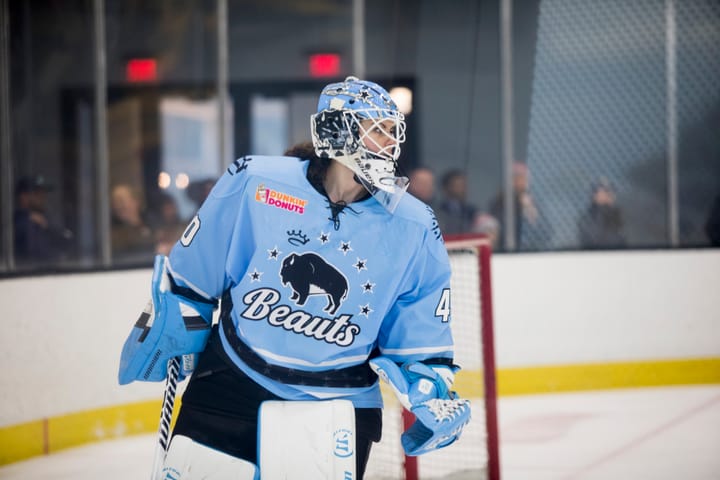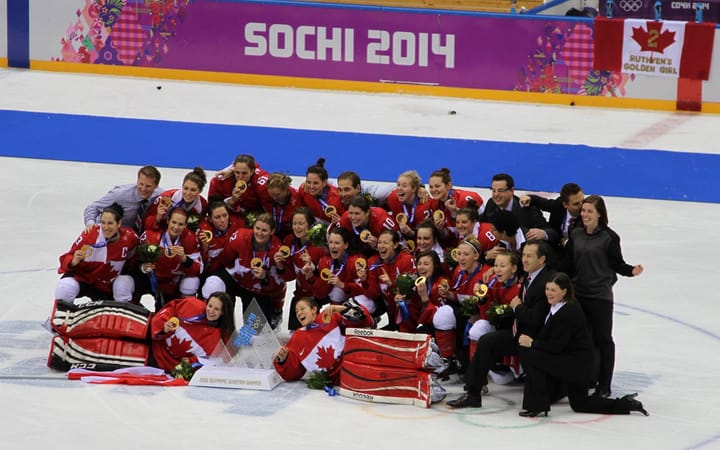‘Just leave it all out there’: On returning for a fifth year
Returning seniors Caitrin Lonergan, Olivia Knowles, and Emma Polusny reflect on their decision to take advantage of their extra year of NCAA eligibility.
There’s no question that the 2020-21 season of women’s hockey has been one of the most irregular the sport has ever witnessed — whether at the professional, international, or collegiate levels. Between the NWHL’s suspension of their Lake Placid season due to COVID-19, the PWHPA’s postponement of the St. Louis stop of the Secret Dream Gap Tour, the cancellation (and subsequent rescheduling) of Women’s Worlds, and multiple series cancellations across the NCAA, this year has been rife with uncertainty.
Amidst all of the unknowns, though, there was a bright spot.
In October 2020, the NCAA announced Division I winter sport student-athletes (a group that includes collegiate women’s hockey players) would “receive both an additional season of competition and an additional year in which to complete it.”
Some college seniors remember exactly where they were when they heard the news.
“I remember the first thing I did is I screenshotted it and sent it to [Clarkson head coach Matt Desrosiers], and was like, ‘Oh my gosh, does this apply to me as well, since I already redshirted from my shoulder?’” says Clarkson forward Caitrin Lonergan. “He was like, ‘That’s the question. I’m asking the athletic director right now.’”
For Lonergan, the decision to return to Clarkson was easy — if there was a spot for her on the roster, she wanted to be there.
“[Desrosiers] kind of asked all the seniors like, right when it happened ... ‘If we were to offer you another year, would you take it?’ And I said, ‘Yes, right away.’”
Other players, like Minnesota defender Olivia Knowles and St. Cloud State goaltender Emma Polusny, didn’t immediately know what the decision meant for them and for their futures.
“If you would have asked me this last year, before the pandemic, I may have said, ‘No, you know what, I’m going to be done with hockey, or maybe I’ll go play in Europe or something like that,’” says Knowles.
Polusny echoes Knowles’ sentiments. “It obviously came up in the locker room with a lot of us talking about what we would end up doing the following year, and I wasn’t leaning one way or the other; I was really just kind of unsure about it.”
The decision to take advantage of an extra year of eligibility might seem like a no-brainer to those watching from afar, especially given the current landscape of professional women’s hockey. Playing an extra year under coaches whose styles and strategies you know, with teammates with whom you’ve already shared triumphs and tears...what college senior wouldn’t do everything within their power to stay?
The reality is that there are so many factors that go into making this kind of decision that we don’t know about, and whose sensitivity we ought to respect.
Some student-athletes, like Knowles and Lonergan, found that taking advantage of the extra year of eligibility actually benefits them from an academic perspective. Taking a fifth — or, in Lonergan’s case, a sixth — year means that they will have more time and flexibility to complete their respective degrees without having to overwhelm themselves with coursework.
“If I wouldn’t have gotten the fifth year, I would have had to really pile on like, 18 credits one semester, and then also work all summer, and now I’m able to spread those out,” says Knowles, who is combining her Bachelor’s in sports management with a journalism degree after being accepted to Minnesota’s Hubbard School of Journalism at the start of her junior year.
On the other hand, Lonergan has been working towards her Master’s degree for a year now after finishing her undergraduate degree at Clarkson during the season she was sidelined due to injury. Even before the NCAA’s decision, she had been planning on returning to Clarkson to finish her degree in person.
“Hockey was kind of a bonus to all of this that, you know, I was just excited about. I love Clarkson. And I’m really happy here. So the more time I can get the merrier,” she says.
While some fourth years — notably Élizabeth Giguère, Corinne Schroeder, and Clair DeGeorge — opted to finish out their eligibility at another institution, the three seniors I chatted with immediately knew that transferring wasn’t an option they wanted to entertain.
“I wouldn’t want to do it anywhere else,” Knowles says. “[Minnesota] is where I chose to go as a 16 year old and it’s been one of the best choices of my life. I love it here, the people the place, the school, the hockey, and I couldn’t imagine transferring anywhere else because I just feel like this is home, and I wouldn’t want to play anywhere else.”
Polusny adds, “It was kind of a no-brainer to say, ‘Yeah, I’m gonna come back, of course I’m coming back to St. Cloud,’ just because the relationships I’ve made here are just amazing and it’s really what made my college career special.”
“I wouldn’t want to do it anywhere else. [Minnesota] is where I chose to go as a 16 year old and it’s been one of the best choices of my life.”
For Lonergan, who had yet to get the real Clarkson experience due to a shoulder injury that sidelined her for almost all of the 2019-20 season, as well as the safety protocols in place during the 2020-21 season, there was no question that she wanted to lace up her skates and take the ice at Cheel Arena for another year.
“For me, it was either I got a spot at Clarkson or I was done,” she says, though she warns me that her plans for the future do not foretell hanging up her skates any time soon.
“Originally, before the fifth year, my goal was to continue to play, whether that was going to be with the national team, or with the NWHL or the PWHPA or even up in Europe. I started doing like a little bit of research, just to kind of figure out a plan that I wanted to go forward with.”
Polusny, on the other hand, jokes that, “I stayed in college so I wouldn’t have to figure out the rest of my life,” but mentions that she definitely wants to stay involved with hockey once her collegiate playing days are done — whether that’s playing professionally or coaching, as she’s been doing with the Minnesota High Performance programs, remains to be seen.
How to like them saves?
— St. Cloud State WHockey (@SCSUHUSKIES_WHK) December 5, 2020
Emma Polusny with a big time save keeps things knotted at 0-0 with 10:31 remaining in the first #unleashSCSU #WCHAHockey #SCSUHuskies pic.twitter.com/pKSCtjQlJm
“I think that there are so many great opportunities out there for women to continue playing after college that it’s definitely crossed my mind, you know, going abroad and playing overseas somewhere like Sweden or Germany,” she says, adding that a couple of her former teammates are playing in Europe and she’d love nothing more than to reunite and reconnect with them.
Looking ahed to next year, a handful of NCAA Division I women’s college hockey conferences have already announced their schedules and their respective arenas’ capacity limits for the 2021-22 season — a development that’s got all three players eagerly awaiting their respective season openers.
Lonergan says that one of the most exciting parts of returning to Clarkson next year is the possibility of playing in front of fans at Cheel, and recalls the spiritedness of the crowds during her redshirt year. She hopes that the pandemic won’t have put a damper on that energy when fans do return to their seats.
There are a couple of special fans, though, that Lonergan will be looking for in the stands.
“My family hasn’t seen me play in person two years, since BC. So I’m just really excited for them to come up to Clarkson and kind of see why I chose, you know, Clarkson, and what has made it so special for me,” she says.
Knowles is looking forward to re-establishing the ethos of Minnesota’s program: being a great teammate on the ice and caring about each other off the ice.Though the Gophers were lucky enough never to have had a serious issue with protocols or positive tests, there was still a “sense of tension and nerves” regarding the potential for bringing a case back to the program.
“You didn’t want to see your significant other or go see your family or something like that in case they had it,” she says. “So I think, in a weird way, it was almost like people were always kind of homesick and kind of missing someone.”
When any chapter draws to a close, it’s natural to think about what kind of legacy you’re leaving behind, whether on the program as a whole or on the teammates with whom you’ve shared the last four years.
“I want to be a great teammate more than anything,” says Polusny. “I want everybody that I’ve had the chance to play with to say that I was a great teammate, that I did everything I could to help the team and help them personally become better people as I think they did the same for me.”
Knowles made it her goal during the 2020-21 season to bring the most energy to the first drill of practice, a feat she said was “totally in [her] control” and that would set the tone for every practice by giving her teammates a starting point to build off of.
“And I kind of want that to be my legacy,” she says, “where I’m an accountable teammate and I’m going to show up for everyone, on and off the ice. I think that’s my legacy is showing up and bringing the energy always.”
By the end of her collegiate career, Lonergan will have spent three years as a Boston College Eagle and three years as a Clarkson Golden Knight, though she’ll only have been on the ice and skating with the latter team for two years. Nevertheless, she’s hopeful that she’s made an impact on both programs.
“I just want to be known as a player that made an impact on and off the ice in whatever way I possibly could,” says Lonergan. “I’m just really grateful and hope that I can leave an impression that, you know, on and off the ice, I was a good teammate, a good leader, and a good hockey player.”
Getting an extra year of eligibility is something no player, coach, or fan could have prophesied. Reflecting on the NCAA’s decision, all three athletes are thankful for the opportunity to finish out their career on a high note, surrounded by the teammates and the cities that they’ve come to love during their collegiate tenures.
Polusny says it best: “I’m really just looking forward to one more year and getting to play a full schedule, hopefully, and, you know, just leave it all out there.”





Comments ()